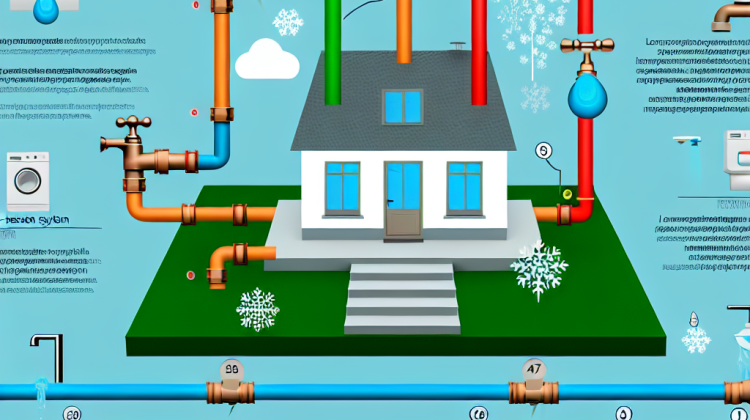
Did you know that a well-designed plumbing system can actually save you money on your water bill? That’s right! Having efficient house plumbing that works in all seasons keeps things running smoothly and can even make your home feel cozier. Long ago, people didn’t have access to modern plumbing, and indoor plumbing was a luxury. It all started back in ancient civilizations, where they used simple aqueducts and clay pipes to transport water. Fast forward to today, and we’ve got advanced plumbing systems that keep our homes comfortable year-round.
Making sure your plumbing works in all seasons is super important, especially for places that get really cold. In winter, pipes can freeze and burst, making a huge mess. One way to avoid this is by insulating your pipes when the temperature drops. You can use foam tubes or even old towels if you’re in a pinch. Just wrapping them up snugly keeps them warm and happy! Plus, it’s a pretty simple fix that doesn’t require a ton of fancy tools.
As for the warm months, the plumbing needs just as much attention. With all that outdoor activity, you may find yourself using the hose more often for watering the garden or washing the car. This is a great time to check for leaks. Did you know that a small drip can waste more than 3,000 gallons of water a year? Yikes! Catching those leaks early not only helps you save water but also saves you some cash on that next water bill.
It’s also a good idea to keep an eye on your drains, especially in the summer when leaves and dirt can cause blockages. If you’re careful with what goes down the sink, you can prevent all sorts of headaches. Think about using a drain cover to catch hair and other debris. It may seem small, but those little efforts go a long way in keeping your plumbing system healthy all year long.
Now, if your home has a sewer system, you’ve got to stay on top of that too. Regular maintenance helps avoid nasty backups, which no one wants to deal with, right? A good rule of thumb is to schedule a cleaning about once a year. It’s like a check-up for your plumbing, and it really helps keep everything flowing smoothly.
Lastly, finding the right fixtures for your home can also make a big difference. Low-flow toilets and faucets save water and fit right into today’s eco-friendly vibes. Not only do they help the environment, but they can give you peace of mind knowing you’re doing your part. Investing a bit in the right plumbing fixtures will pay off in the long run. It’s all about making small changes for big improvements!
How to Make Your House All-Season Plumbing
When it comes to keeping your plumbing working no matter the season, there are some smart steps to take. You want to stay warm in winter and cool in summer, so let’s get started on making your plumbing all-ready for any weather!
Check for Leaks
First things first, leaks can really mess things up. Be on the lookout for any dripping faucets or running toilets. A small drip may not seem like much, but it can waste gallons of water. That’s money down the drain, literally!
- Look under sinks and around toilets.
- Check your basement and crawl spaces for damp patches.
If you find a leak, you can usually fix it with some DIY skills or call a plumber.
Insulate Your Pipes
To keep your water warm in chilly winter months, you might want to wrap your pipes. Insulation helps pipes not freeze. Here’s how you do it:
- Use foam pipe insulation or heat tape.
- Wrap it around the pipes in your basement or crawl space.
On colder nights, keep a little trickle of water running from faucets. It’ll help keep pipes from freezing up!
Know Your Drains
Let’s chat about those drains. You don’t want them clogging up. Make sure you’re careful about what goes down them. Here are some easy tips:
- Use drain covers in the bathroom to catch hair.
- Avoid pouring grease down the kitchen sink.
- Every month, flush your drains with hot water and baking soda to keep things flowing smoothly.
Keeping your drains clear will help with plumbing for all seasons!
Flush Your Water Heater
Don’t forget about your water heater! A good rule of thumb is to flush it once a year. This helps remove sediment that can build up and make it work harder. Follow these simple steps:
- Turn off the heater and let it cool for a bit.
- Connect a hose to the drain valve and direct it to a bucket.
- Open the valve and let the water run out until it’s clear.
Remember to check your water heater’s temperature setting too. It should be around 120 degrees Fahrenheit for safety and efficiency!
Install a Water Softener
If you live in an area with hard water, your plumbing can take a beating. A water softener helps reduce the minerals that cause buildup in pipes. This can help your plumbing last longer. It’s an investment worth considering!
- Shop around for water softeners.
- Ask local experts for advice on which one works best in your area.
Regular Maintenance is Key
Just like taking your car for a tune-up, your plumbing needs some TLC too. Schedule a regular plumbing check-up at least once a year. A pro can catch any problems before they become big headaches.
Staying ahead of plumbing issues helps your home stay safe and cozy no matter the season. Remember, good plumbing not only keeps your water flowing but also saves you some bucks in the long run. Did you know that fixing leaks promptly can save you up to 10,000 gallons of water each year? That’s enough to fill a swimming pool!
“`html
How to Make House All Season Plumbing FAQ
1. What’s the first step to winterize my plumbing?
Start by turning off the water supply to your outdoor faucets. After that, drain the pipes by opening the faucets to let any leftover water flow out.
2. How can I prevent my pipes from freezing?
To keep your pipes from freezing, open cabinet doors to let warm air in, and let your faucets drip slightly when it’s super cold outside. This helps keep water moving and prevents ice from forming.
3. What should I do if my pipes burst?
If you find a burst pipe, turn off the main water supply right away. Then, call a plumber to help fix the problem. Don’t forget to clean up any water to avoid mold!
4. Do I really need to drain my water heater?
Yep! Draining your water heater at least once a year helps remove sediment build-up. This keeps your heater working smoothly and extends its life.
5. How can I tell if I have a leak?
If you notice water stains on your walls or ceilings, hear running water when everything’s off, or see an unusually high water bill, you might have a leak!
6. Can I use chemicals to clear a clogged drain?
Sometimes, but be careful! Chemical drain cleaners can damage your pipes. It’s smarter to try a plunger or a drain snake first.
7. What’s the best way to flush my toilet?
Flushing a toilet is pretty simple! Just press the handle or button on the tank, and make sure it all flushes down. If it sticks, you might need to fix or replace the flapper inside.
8. Should I cover my outdoor pipes in winter?
Yes! Wrapping them with insulated tape or pipe sleeves will add some protection from the cold. This helps your pipes stay warm and safe!
9. How often should I check my plumbing?
It’s a good idea to check your plumbing every season. Look for leaks, rust, or any signs of trouble so you can catch issues early!
10. Can I fix small plumbing problems myself?
For sure! Small issues like leaky faucets or clogged drains can often be fixed with some basic tools and a DIY attitude. Just make sure you know what you’re doing, or ask someone for help!
“`
Conclusion
To make sure your house’s plumbing works well all year round, you gotta start with a few simple steps. First off, insulate those pipes! When the chilly months roll in, wrap your pipes with foam or tape. This helps keep ’em warm and prevents freezing. Next, you wanna check for leaks. A little drip might not seem like a big deal, but it can lead to bigger problems later on. If you spot one, grab some plumber’s tape or call in the pros! Keeping your pipes in check goes a long way towards hassle-free plumbing.
Now, don’t forget about your drains! Regularly clean ’em out to avoid clogs. You can use a mix of baking soda and vinegar once a month for a natural clean-up. And hey, during winter, let a trickle of water run in your faucets when it’s super cold outside. This helps keep the pipes from freezing. Lastly, a seasonal plumbing inspection can really save you a headache. A plumber knows what to look for and can fix any issues before they turn into a plumbing drama. Follow these tips, and believe me, your plumbing will be ready to tackle whatever Mother Nature throws your way!
